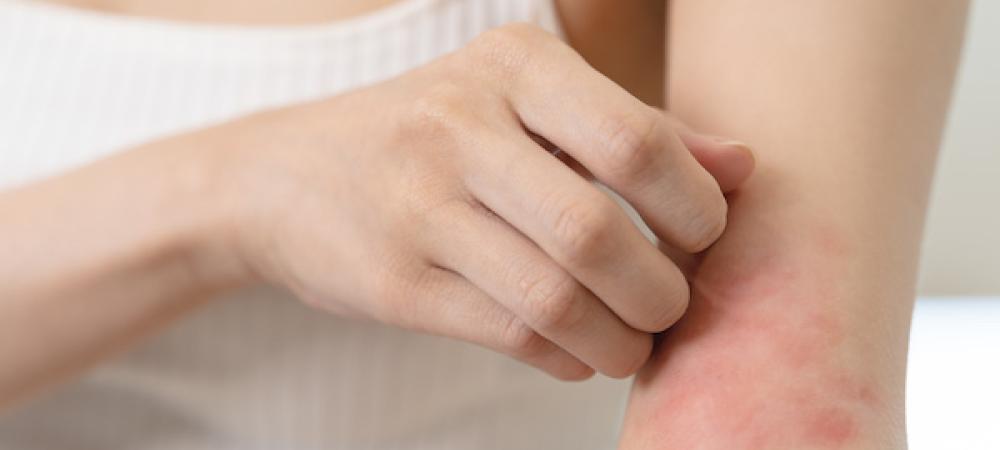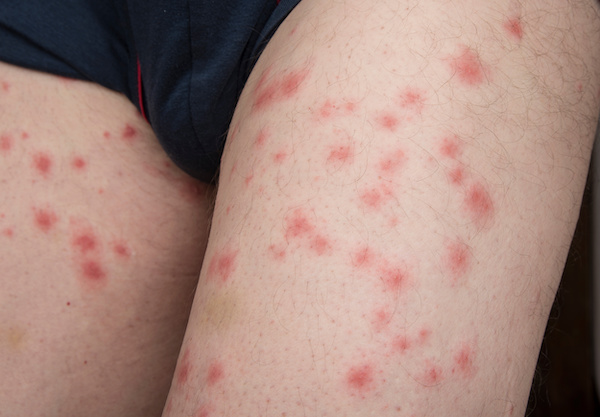Differences Between a Bed Bug Bite and a Mosquito Bite

Have you ever woken up with itchy red bumps on your skin? Are they annoying mosquito bites or a sign of something more sinister lurking in your bedroom?
Knowing the difference between a bed bug bite and a mosquito bite requires a keen eye and an in-depth understanding of both pests. That’s why we’re here to help!
In this blog, we’ll break down the differences between the bites of both pests, helping you identify the culprit and take the necessary steps to eliminate them quickly.
Bed Bug Bites
Bed bug bites are small, red, raised bumps on the skin. Unlike mosquito bites, which tend to appear as singular welts spread out across the skin, bed bug bites are often clustered together in rows or groups because of the multiple nightly feeding sessions.
Although they resemble mosquito or flea bites, bed bug bites cause more inflammation and may include a darker red center. These bites can develop into itchy blisters or pustules in more sensitive individuals.
Because bed bugs feed on us as we sleep, you’re more likely to find bites on any exposed area, like your face, neck, arms, and hands. However, these pests will snack on other parts of your body like your legs, back, or torso, primarily depending on what you wear to sleep.
The distribution of bed bug bites varies depending on how you sleep at night, your bedding, and your clothing. While full-coverage PJs will give you adequate protection, a full comforter may provide extra hiding spots for the insects.
So, how do you know if a bed bug bites you? Symptoms of bed bug bites range from mild itching and irritation to severe allergic reactions. Others can develop redness, swelling, and intense itching within a few hours or days, noticing the marks pop up as they get out of bed in the morning.
While uncommon, you can suffer from a serious allergic reaction that could lead to difficulty breathing or anaphylaxis, requiring immediate medical attention. Excessively scratching the bites can also lead to secondary infections.
Mosquito Bites
Like bed bug bites, mosquito bites typically appear as small, raised, red bumps on the skin. So, what’s the difference between a bed bug bite and a mosquito bite?
Mosquito bites have a distinctive central puncture mark where the mosquito pierced the skin with its feeding tube. The bites become more raised, inflamed, and itchy as the body reacts to the mosquito’s saliva injected while feeding.
While mosquito bites can occur anywhere, they’re more likely to occur on unprotected areas of skin with blood vessels. Most find them on their arms, legs, neck, and face; however, mosquitoes can bite through clothing, so no area is entirely immune to mosquito bites.
Other factors, like species and feeding patterns, can also influence where they bite. For instance, daytime biters may target your arms and legs, while nighttime biters might find any exposed skin as you sleep outdoors in a tent or enjoy a cool night in your backyard.
Mosquito bites usually result in redness, swelling, itching, and discomfort, which typically subside within a few days. However, some people may experience more severe reactions like “Skeeter syndrome,” characterized by sizeable localized swelling, blistering, or an allergic reaction.
The buzz about severe mosquito bite reactions
Differences Between a Bed Bug Bite and a Mosquito Bite
Got all that? Don’t worry; we have a recap and overview of everything you need to know about what sets these two blood-sucking pests apart. Here are some key differences between bed bug bites and mosquito bites.

Visual appearance
Bed bug bites are typically small bumps clustered in a linear or zigzag pattern. They may have a darker red center and are commonly found on areas of the body that are exposed during sleep.
Mosquito bites are usually singular welts or bumps that vary in size and shape. They may have a central puncture mark where the mosquito inserted its proboscis. You’ll typically notice these marks after a day outdoors in mosquito-infested areas.
Reaction time
Bed bug bites often take time to manifest noticeable symptoms, with reactions appearing within a few hours to days after being bitten. This delayed reaction can make identifying and differentiating bed bug bites from other pests challenging.
On the other hand, mosquito bites tend to cause quicker reactions, with symptoms such as redness, swelling, and itching appearing within minutes to hours after being bitten. You’ll often notice the telltale itch after a long day outdoors.
Duration of symptoms
Symptoms of bed bug bites may persist for several days to weeks, depending on individual sensitivity and the severity of the infestation. Itchiness and inflammation can often linger even after the initial bites have healed.
Mosquito bite symptoms typically resolve quicker, with the redness, swelling, and itching subsiding within a few days. However, regular scratching and picking at the bites can lengthen the healing process or even introduce infection.
Disease Transmission
The biggest difference between a bed bug bit and a mosquito bite is the potential aftermath. Mosquitoes are vectors of diseases like West Nile, Zika, dengue, and malaria.
Once an infected mosquito feeds on someone, it can transmit the pathogen and spread it to other hosts in subsequent feedings. According to the CDC, the United States saw almost 2500 cases of West Nile virus, with Virginia having 12 cases and Maryland having 10.
This disease is no joke, either! While some with the virus never show symptoms, they can carry around the disease and inadvertently pass it to other hosts via mosquitoes. Others may experience febrile illness resulting in severe flu-like symptoms and rash.
Severe cases can lead to encephalitis or meningitis, both serious diseases that cause brain swelling and inflammation and long-term side effects.
Though their bites can be uncomfortable and lead to itching, bed bugs can’t transmit infectious diseases like mosquitoes. However, a bed bug infestation can still significantly impact your well-being. These persistent critters can cause psychological stress and sleepless nights.
Get Rid of Bed Bugs and Mosquitoes with Connor’s Pest Pros!
Prevention is our best line of defense as we tackle the challenges of bed bugs and mosquitoes. Check out our tips below!
Prevention Tips for Bed Bugs
- While traveling, routinely check your surroundings, including furniture, bedding, and luggage.
- Use protective covers to encase your mattresses and pillows.
- Keep your space clutter-free to reduce hiding spots for bed bugs.
- Seal any cracks and crevices around doors, windows, and baseboards to block their entry.
Prevention Tips for Mosquitoes
- Eliminate standing water around your property where mosquitoes breed.
- Use insect repellents containing DEET outdoors, especially during peak mosquito activity times.
- Install insect screens on your windows and doors to prevent mosquitoes.
- Wear long sleeves and pants when outdoors.
These preventive measures can significantly lower the risk of infestations and bites from bed bugs and mosquitoes. However, if you’re dealing with a persistent infestation, we suggest you contact a professional pest control service like the experts at Connor’s Pest Pros!
When dealing with stubborn pests in Virginia, Maryland, or DC, call us!
